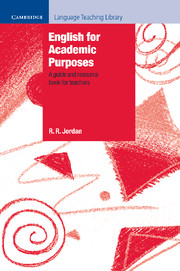Book contents
- Frontmatter
- Contents
- List of figures
- List of abbreviations
- Acknowledgements
- Introduction
- Part I English for Academic Purposes and study skills
- Part II Study skills and practice (EGAP)
- Part III English for Specific Academic Purposes
- Chapter 16 Academic discourse and style
- Chapter 17 Subject-specific language
- Chapter 18 Materials design and production
- Chapter 19 Concerns and research
- Appendices
- References
- Subject index
- Author index
Chapter 19 - Concerns and research
Published online by Cambridge University Press: 10 November 2010
- Frontmatter
- Contents
- List of figures
- List of abbreviations
- Acknowledgements
- Introduction
- Part I English for Academic Purposes and study skills
- Part II Study skills and practice (EGAP)
- Part III English for Specific Academic Purposes
- Chapter 16 Academic discourse and style
- Chapter 17 Subject-specific language
- Chapter 18 Materials design and production
- Chapter 19 Concerns and research
- Appendices
- References
- Subject index
- Author index
Summary
In EAP teaching and institutions, in the designing and implementing of EAP courses, and in the EAP profession as a whole, a number of concerns or issues have emerged in recent years. Inevitably, these have varied from institution to institution, and from country to country. The fact that there are concerns often prompts investigations: these, in turn, can lead to research projects which, also in turn, may lead to solutions or suggestions for materials development, teaching techniques, etc.
The purpose of this chapter is to look at some of the areas of concern that exist at present, together with some that have been with EAP since its inception. This will lead in to a consideration of research methods that are appropriate for EAP. Finally, we shall note the variety of EAP areas that are currently under investigation.
Concerns
Some of the main concerns are listed below in the form of questions. No attempt is made to answer these: in some cases it will vary from place to place; in others, investigations are still under way. Many aspects are involved: finance, administration, organisation, specialist departments, materials, methodology, teaching and learning.
- Type
- Chapter
- Information
- English for Academic PurposesA Guide and Resource Book for Teachers, pp. 272 - 281Publisher: Cambridge University PressPrint publication year: 1997



